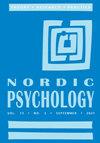Active lifestyle as a reflection of cognitive reserve: The Modified Cognitive Reserve Scale
IF 1.1
4区 心理学
Q4 PSYCHOLOGY, MULTIDISCIPLINARY
引用次数: 7
Abstract
Cognitive reserve (CR) refers to individual differences in cognitive processing that can protect from and compensate for functional decline related to ageing or brain pathology. The CR theory postulates that attaining an active and cognitively stimulating lifestyle can accumulate CR. The Cognitive Reserve Scale (CRS) is a questionnaire that measures lifelong attainment in leisure activities. This cross-sectional study aimed to examine the usefulness, validity and reliability of a modified Finnish translation of the CRS, the Modified Cognitive Reserve Scale (mCRS). The mCRS consists of 20 questions concerning studying and information seeking, hobbies and social relationships during three age phases: young adulthood (18–35 years), adulthood (36–64 years) and late adulthood ( 65 years). A group of 69 neurologically healthy adults aged 26–78 filled the mCRS and completed a neuropsychological test battery. We examined the internal consistency of the mCRS and associations between the mCRS, demographical variables and cognitive performance. The mCRS was normally distributed and showed satisfactory internal consistency (Cronbach’s alpha 0.81). It was significantly associated with occupation (ԑ 1⁄4 0.14) and education (rho 1⁄4 0.51) but not with age or gender. There were significant associations between the mCRS and verbal reasoning (rho 1⁄4 .306), visual reasoning (r 1⁄4 .319), learning (r 1⁄4 .293) and inhibition (rho 1⁄4 -.368). Our study suggests that the mCRS is a reliable and valid method to assess lifelong leisure activity. The mCRS is related to other factors that enhance CR, occupation and education, and associated with cognitive performance of healthy adults. It provides an easily administrable means to assess lifelong attainment in stimulating leisure activities.作为认知储备反映的积极生活方式:改良的认知储备量表
认知储备(CR)是指认知过程中的个体差异,可以保护和补偿与衰老或大脑病理有关的功能下降。认知储备量表(CRS)是一种测量终身休闲活动成就的问卷。这项横断面研究旨在检验CRS的改良芬兰语翻译——改良认知储备量表(mCRS)的有用性、有效性和可靠性。mCRS由20个问题组成,涉及三个年龄阶段的学习和信息寻求、爱好和社会关系:青年期(18-35岁)、成年期(36-64岁)和成年晚期(65岁)。一组69名年龄在26-78岁之间的神经健康成年人填写了mCRS,并完成了神经心理测试。我们研究了mCRS的内部一致性,以及mCRS、人口学变量和认知表现之间的关联。mCRS呈正态分布,显示出令人满意的内部一致性(Cronbachα0.81)。它与职业(ԑ1⁄4 0.14)和教育(rho 1⁄4.0.51)显著相关,但与年龄或性别无关。mCRS与言语推理(rho 1⁄4.306)、视觉推理(r 1⁄4.219)、学习(r 1‑4.293)和抑制(rho 1/4-.368)之间存在显著关联。我们的研究表明,mCRS是评估终身休闲活动的可靠有效方法。mCRS与其他增强CR、职业和教育的因素有关,并与健康成年人的认知表现有关。它提供了一种易于管理的方法来评估在刺激休闲活动中的终身成就。
本文章由计算机程序翻译,如有差异,请以英文原文为准。
求助全文
约1分钟内获得全文
求助全文

 求助内容:
求助内容: 应助结果提醒方式:
应助结果提醒方式:


